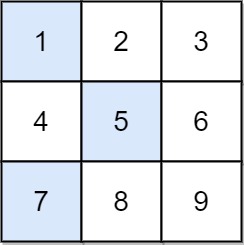2024-04-26 Daily Challenge
Today I have done leetcode's April LeetCoding Challenge with cpp.
April LeetCoding Challenge 26
Description
Minimum Falling Path Sum II
Given an n x n integer matrix grid, return the minimum sum of a falling path with non-zero shifts.
A falling path with non-zero shifts is a choice of exactly one element from each row of grid such that no two elements chosen in adjacent rows are in the same column.
Example 1:

Input: grid = [[1,2,3],[4,5,6],[7,8,9]] Output: 13 Explanation: The possible falling paths are: [1,5,9], [1,5,7], [1,6,7], [1,6,8], [2,4,8], [2,4,9], [2,6,7], [2,6,8], [3,4,8], [3,4,9], [3,5,7], [3,5,9] The falling path with the smallest sum is [1,5,7], so the answer is 13.
Example 2:
Input: grid = [[7]] Output: 7
Constraints:
n == grid.length == grid[i].length1 <= n <= 200-99 <= grid[i][j] <= 99
Solution
class Solution {
public:
int minFallingPathSum(vector<vector<int>>& grid) {
vector<int> minimum = {0, 0};
int minIndex = -1;
int cols = grid.front().size();
for(const auto &row : grid) {
// cout << minimum[0] << ' ' << minimum[1] << ' ' << minIndex << endl;
int newIndex = -1;
vector<int> newMinimum = {INT_MAX, INT_MAX};
for(int j = 0; j < cols; ++j) {
int mmin = row[j] + minimum[j == minIndex];
if(mmin < newMinimum[0]) {
newMinimum[1] = newMinimum[0];
newMinimum[0] = mmin;
newIndex = j;
} else if(mmin < newMinimum[1]) {
newMinimum[1] = mmin;
}
}
swap(minimum, newMinimum);
minIndex = newIndex;
}
return minimum[0];
}
};